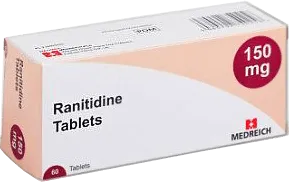
Images are for illustration purposes only.
Ranitidine 150mg Tablets
From £16.99
Includes free private prescription
Out of stock
- Classified as H2 blockers
- Fast relief against peptic ulcers and gastro-oesophageal reflux disease
- Works by blocking the histamine found in the stomach
Available strengths:
Expected Delivery: Friday
Why choose Click Pharmacy?
- Rated 'Excellent' on Trustpilot
- Free Online Assessment
- Price Match Guarantee
GPhC Internet Pharmacy Registration
UK Pharmacy Registration Number 9011460
Ranitidine Prices
| Strength | 65 Tablets |
|---|---|
| 150 mg | £16.99 |
Buy Ranitidine Online UK
You can order Ranitidine online in the UK from our registered pharmacy. Complete the online medical assessment to be reviewed by one of our prescribers. If approved, your medication will be dispensed by our pharmacy team for next day delivery to your address.
About Ranitidine
Ranitidine is intended to provide immediate relief from peptic ulcers, gastro-oesophageal reflux disease-causing heartburn, chronic indigestion, and ulcers that form due to the use of non-steroidal anti-inflammatory medications such as diclofenac.
Ranitidine Summary Information
|
Type of medicine |
Acid reflux treatment |
|
Use |
Treats conditions caused by excess stomach acid |
|
How it works |
Reduces the production of stomach acid |
|
Active Ingredient |
Ranitidine |
|
Directions of use |
Oral tablets, taken once or twice daily |
|
Available strengths |
150 mg |
|
Side effects |
Constipation, diarrhea, abdominal pain, constipation, nausea, vomiting |
|
Generic |
Yes |
The information provided in the summary table is for reference only. It is important to consult a qualified healthcare professional before starting any acid reflux treatment, including Ranitidine.
How effective Is Ranitidine?
Ranitidine is an effective way of managing and controlling symptoms such as heartburn, indigestions and stomach ulcers. It is a fast-acting treatment that offers relief within one or two hours upon ingestion. The effect lasts for 12 hours, but you are advised to follow the doctor's instructions since this is a prescription-only medication. Ranitidine takes a few weeks to work effectively.
How does Ranitidine work?
Ranitidine belongs to a class of medications known as H2 receptors. It works by blocking the H2 receptors – found in the stomach lining - from producing excess stomach acid, thus addressing symptoms such as acid aspiration during labour, or surgery, recurrent bleeding from peptic ulcers and bleeding from stress ulceration in people who are critically ill.
Ranitidine tames the backflow of acid into the oesophagus preventing heartburn symptoms and damage to the oesophagus. It also reduces the amount of stomach acid that flows into the duodenum allowing peptic ulcers to heal and preventing recurrent bleeding.
Patient Information Leaflet
Always read the patient information leaflet before starting your treatment. The patient information can be found here.
What dose should I choose?
Ranitidine is available in different strengths, and only Ranitidine 75mg is available over the counter without a prescription. It is suitable for persons over 16 years and adults.
Otherwise, other Ranitidine treatments require a prescription, and the dosage should be taken as per the doctor's instructions.
How should I take Ranitidine
Follow the doctor’s prescription while taking this medicine. Swallow each tablet whole and with water.
Usually, the dose prescribed will depend on your condition. From children over the age of 12 years to adults, the prescribed dose is 150 mg twice a day, in the morning/evening, or 300 mg at bedtime.
The doctor works out the right dosage based on your prescription.
Nevertheless, do not forget to read instructions for best use.
Side effects
The main side effect of using this medication may be a stomach upset or diarrhoea, as Ranitidine contains castor oil.
However, if you notice side effects such as itching or hives on the skin, swelling of the lips, face, tongue or any other parts of the body, shortness of breath, wheezing, chest pains, trouble breathing, fever or feeling weak when standing up, notify your doctor immediately. These are all signs of an adverse reaction towards the medicine, and you may be allergic to the ingredients in the product.
This medication may also affect your kidneys by changing the amount and colour of the water you pass. This could lead to pain when passing urine, blood in urine, fever, back pain and changes in blood tests.
In the same way, Ranitidine may cause side effects such as severe stomach pain (pancreatitis), slow or irregular heartbeat, stomach pain, nausea, constipation, skin rash, changes to liver functions and other rare side effects that maybe detected in blood tests.
Therefore if ever you experience any of the listed side effects, including those not indicated on your leaflet, seek immediate help from your GP or hospital.
You are also welcome to consult our specialists at Click Pharmacy should you require any further advice.
Discreet Delivery
Once your order has been approved, it will be dispatched via Royal mail. All orders are sent using a tracked and signed for service.
Delivery charges
Economy Delivery | £3.50 (Track 24). Delivered within 2-3 working days (Excludes Sundays and bank holidays).
Standard | £4.50 (Track 48). Delivered within 1-2 working days (Excludes Sundays and bank holidays).
Next Day Delivery Guaranteed before 1pm | £7.95. Delivered within 1 working day before 1pm (Excludes Sundays and bank holidays).
Find out more about our delivery service
Further information on return and refunds
Ranitidine Reviews
Related Acid Reflux Treatment advice & articles
How it works
Order your Acid Reflux Treatment medication in a few clicks. Ordering from us is easy, fast and discreet.
Free Online Assessment
Answer a few simple questions about your health.
Choose Your Medication
Our prescribers will review and guide you to the right treatment.
Fast Delivery
Once approved, your treatment is dispatched discreet packaging by next day delivery.
Expected Delivery: Friday